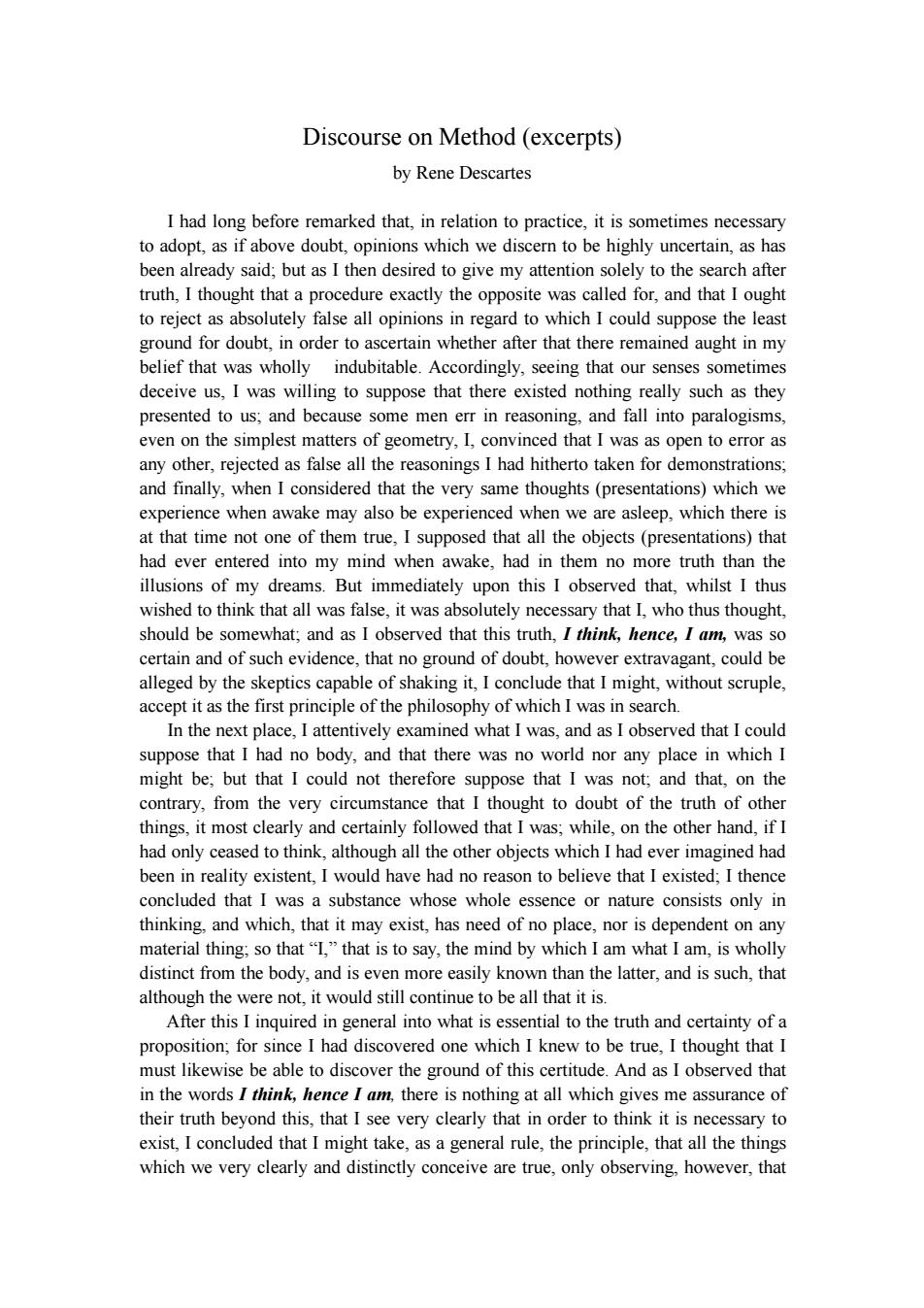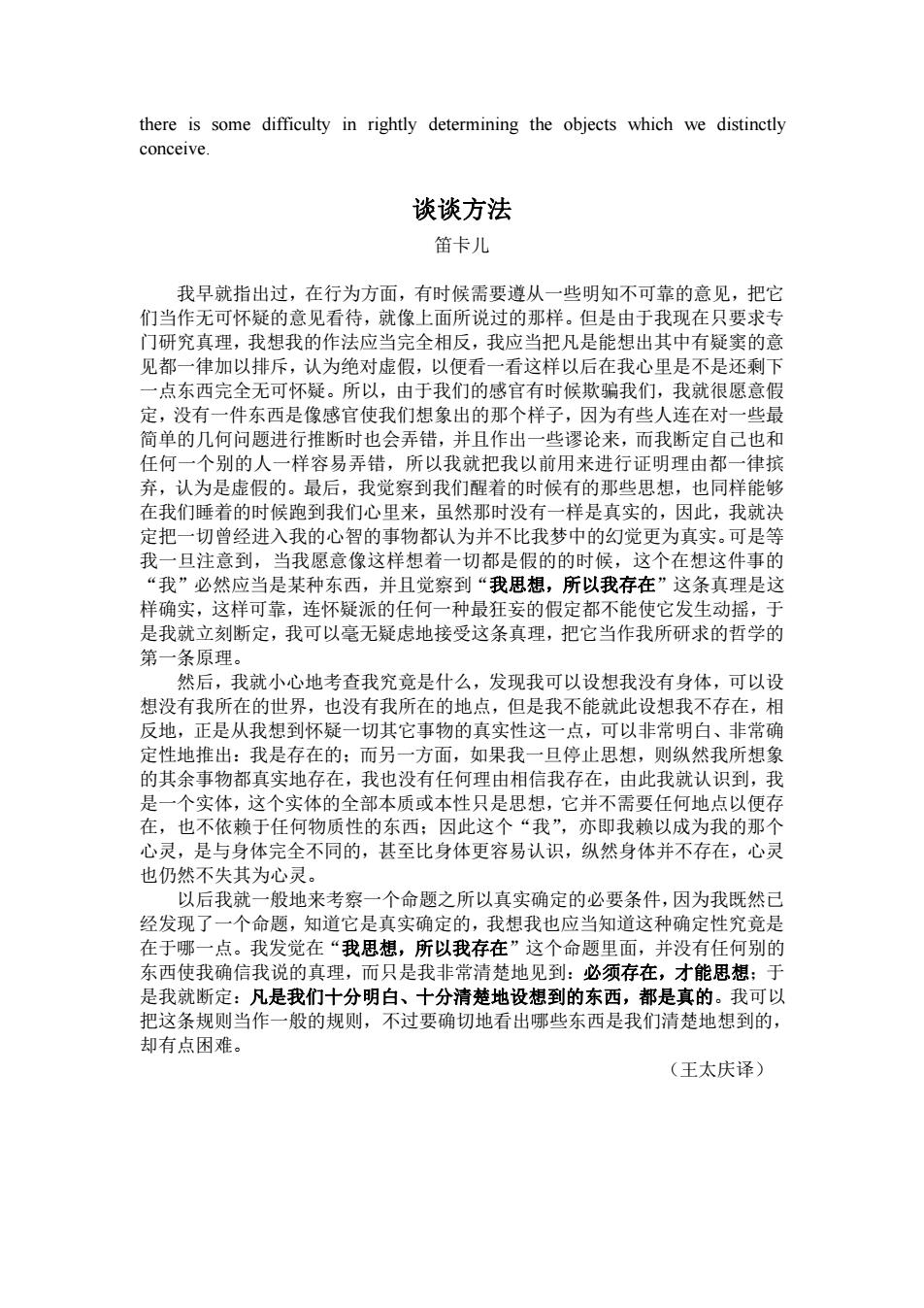
Discourse on Method (excerpts) by Rene Descartes I had long before remarked that,in relation to practice,it is sometimes necessary to adopt,as if above doubt,opinions which we discern to be highly uncertain,as has been already said;but as I then desired to give my attention solely to the search after truth,I thought that a procedure exactly the opposite was called for,and that I ought to reject as absolutely false all opinions in regard to which I could suppose the least ground for doubt,in order to ascertain whether after that there remained aught in my belief that was wholly indubitable.Accordingly,seeing that our senses sometimes deceive us,I was willing to suppose that there existed nothing really such as they presented to us;and because some men err in reasoning,and fall into paralogisms, even on the simplest matters of geometry,I,convinced that I was as open to error as any other,rejected as false all the reasonings I had hitherto taken for demonstrations; and finally,when I considered that the very same thoughts(presentations)which we experience when awake may also be experienced when we are asleep,which there is at that time not one of them true,I supposed that all the objects(presentations)that had ever entered into my mind when awake,had in them no more truth than the illusions of my dreams.But immediately upon this I observed that,whilst I thus wished to think that all was false,it was absolutely necessary that I,who thus thought, should be somewhat;and as I observed that this truth,I think,hence,I am,was so certain and of such evidence,that no ground of doubt,however extravagant,could be alleged by the skeptics capable of shaking it,I conclude that I might,without scruple, accept it as the first principle of the philosophy of which I was in search. In the next place,I attentively examined what I was,and as I observed that I could suppose that I had no body,and that there was no world nor any place in which I might be;but that I could not therefore suppose that I was not;and that,on the contrary,from the very circumstance that I thought to doubt of the truth of other things,it most clearly and certainly followed that I was;while,on the other hand,if I had only ceased to think,although all the other objects which I had ever imagined had been in reality existent,I would have had no reason to believe that I existed;I thence concluded that I was a substance whose whole essence or nature consists only in thinking,and which,that it may exist,has need of no place,nor is dependent on any material thing;so that"I,"that is to say,the mind by which I am what I am,is wholly distinct from the body,and is even more easily known than the latter,and is such,that although the were not,it would still continue to be all that it is. After this I inquired in general into what is essential to the truth and certainty of a proposition;for since I had discovered one which I knew to be true,I thought that I must likewise be able to discover the ground of this certitude.And as I observed that in the words I think,hence I am,there is nothing at all which gives me assurance of their truth beyond this,that I see very clearly that in order to think it is necessary to exist,I concluded that I might take,as a general rule,the principle,that all the things which we very clearly and distinctly conceive are true,only observing,however,that
Discourse on Method (excerpts) by Rene Descartes I had long before remarked that, in relation to practice, it is sometimes necessary to adopt, as if above doubt, opinions which we discern to be highly uncertain, as has been already said; but as I then desired to give my attention solely to the search after truth, I thought that a procedure exactly the opposite was called for, and that I ought to reject as absolutely false all opinions in regard to which I could suppose the least ground for doubt, in order to ascertain whether after that there remained aught in my belief that was wholly indubitable. Accordingly, seeing that our senses sometimes deceive us, I was willing to suppose that there existed nothing really such as they presented to us; and because some men err in reasoning, and fall into paralogisms, even on the simplest matters of geometry, I, convinced that I was as open to error as any other, rejected as false all the reasonings I had hitherto taken for demonstrations; and finally, when I considered that the very same thoughts (presentations) which we experience when awake may also be experienced when we are asleep, which there is at that time not one of them true, I supposed that all the objects (presentations) that had ever entered into my mind when awake, had in them no more truth than the illusions of my dreams. But immediately upon this I observed that, whilst I thus wished to think that all was false, it was absolutely necessary that I, who thus thought, should be somewhat; and as I observed that this truth, I think, hence, I am, was so certain and of such evidence, that no ground of doubt, however extravagant, could be alleged by the skeptics capable of shaking it, I conclude that I might, without scruple, accept it as the first principle of the philosophy of which I was in search. In the next place, I attentively examined what I was, and as I observed that I could suppose that I had no body, and that there was no world nor any place in which I might be; but that I could not therefore suppose that I was not; and that, on the contrary, from the very circumstance that I thought to doubt of the truth of other things, it most clearly and certainly followed that I was; while, on the other hand, if I had only ceased to think, although all the other objects which I had ever imagined had been in reality existent, I would have had no reason to believe that I existed; I thence concluded that I was a substance whose whole essence or nature consists only in thinking, and which, that it may exist, has need of no place, nor is dependent on any material thing; so that “I,” that is to say, the mind by which I am what I am, is wholly distinct from the body, and is even more easily known than the latter, and is such, that although the were not, it would still continue to be all that it is. After this I inquired in general into what is essential to the truth and certainty of a proposition; for since I had discovered one which I knew to be true, I thought that I must likewise be able to discover the ground of this certitude. And as I observed that in the words I think, hence I am, there is nothing at all which gives me assurance of their truth beyond this, that I see very clearly that in order to think it is necessary to exist, I concluded that I might take, as a general rule, the principle, that all the things which we very clearly and distinctly conceive are true, only observing, however, that

there is some difficulty in rightly determining the objects which we distinctly conceive 谈谈方法 笛卡儿 我早就指出过,在行为方面,有时候需要遵从一些明知不可靠的意见,把它 们当作无可怀疑的意见看待,就像上面所说过的那样。但是由于我现在只要求专 门研究真理,我想我的作法应当完全相反,我应当把凡是能想出其中有疑窦的意 见都一律加以排斥,认为绝对虚假,以便看一看这样以后在我心里是不是还剩下 一点东西完全无可怀疑。所以,由于我们的感官有时候欺骗我们,我就很愿意假 定,没有一件东西是像感官使我们想象出的那个样子,因为有些人连在对一些最 简单的几何问题进行推断时也会弄错,并且作出一些谬论来,而我断定自己也和 任何一个别的人一样容易弄错,所以我就把我以前用来进行证明理由都一律摈 弃,认为是虚假的。最后,我觉察到我们醒着的时候有的那些思想,也同样能够 在我们睡着的时候跑到我们心里来,虽然那时没有一样是真实的,因此,我就决 定把一切曾经进入我的心智的事物都认为并不比我梦中的幻觉更为真实。可是等 我一旦注意到,当我愿意像这样想着一切都是假的的时候,这个在想这件事的 “我”必然应当是某种东西,并且觉察到“我思想,所以我存在”这条真理是这 样确实,这样可靠,连怀疑派的任何一种最狂妄的假定都不能使它发生动摇,于 是我就立刻断定,我可以毫无疑虑地接受这条真理,把它当作我所研求的哲学的 第一条原理。 然后,我就小心地考查我究竞是什么,发现我可以设想我没有身体,可以设 想没有我所在的世界,也没有我所在的地点,但是我不能就此设想我不存在,相 反地,正是从我想到怀疑一切其它事物的真实性这一点,可以非常明白、非常确 定性地推出:我是存在的:而另一方面,如果我一旦停止思想,则纵然我所想象 的其余事物都真实地存在,我也没有任何理由相信我存在,由此我就认识到,我 是一个实体,这个实体的全部本质或本性只是思想,它并不需要任何地点以便存 在,也不依赖于任何物质性的东西:因此这个“我”,亦即我赖以成为我的那个 心灵,是与身体完全不同的,甚至比身体更容易认识,纵然身体并不存在,心灵 也仍然不失其为心灵。 以后我就一般地来考察一个命题之所以真实确定的必要条件,因为我既然己 经发现了一个命题,知道它是真实确定的,我想我也应当知道这种确定性究竟是 在于哪一点。我发觉在“我思想,所以我存在”这个命题里面,并没有任何别的 东西使我确信我说的真理,而只是我非常清楚地见到:必须存在,才能思想:于 是我就断定:凡是我们十分明白、十分清楚地设想到的东西,都是真的。我可以 把这条规则当作一般的规则,不过要确切地看出哪些东西是我们清楚地想到的, 却有点困难。 (王太庆译)
there is some difficulty in rightly determining the objects which we distinctly conceive. 谈谈方法 笛卡儿 我早就指出过,在行为方面,有时候需要遵从一些明知不可靠的意见,把它 们当作无可怀疑的意见看待,就像上面所说过的那样。但是由于我现在只要求专 门研究真理,我想我的作法应当完全相反,我应当把凡是能想出其中有疑窦的意 见都一律加以排斥,认为绝对虚假,以便看一看这样以后在我心里是不是还剩下 一点东西完全无可怀疑。所以,由于我们的感官有时候欺骗我们,我就很愿意假 定,没有一件东西是像感官使我们想象出的那个样子,因为有些人连在对一些最 简单的几何问题进行推断时也会弄错,并且作出一些谬论来,而我断定自己也和 任何一个别的人一样容易弄错,所以我就把我以前用来进行证明理由都一律摈 弃,认为是虚假的。最后,我觉察到我们醒着的时候有的那些思想,也同样能够 在我们睡着的时候跑到我们心里来,虽然那时没有一样是真实的,因此,我就决 定把一切曾经进入我的心智的事物都认为并不比我梦中的幻觉更为真实。可是等 我一旦注意到,当我愿意像这样想着一切都是假的的时候,这个在想这件事的 “我”必然应当是某种东西,并且觉察到“我思想,所以我存在”这条真理是这 样确实,这样可靠,连怀疑派的任何一种最狂妄的假定都不能使它发生动摇,于 是我就立刻断定,我可以毫无疑虑地接受这条真理,把它当作我所研求的哲学的 第一条原理。 然后,我就小心地考查我究竟是什么,发现我可以设想我没有身体,可以设 想没有我所在的世界,也没有我所在的地点,但是我不能就此设想我不存在,相 反地,正是从我想到怀疑一切其它事物的真实性这一点,可以非常明白、非常确 定性地推出:我是存在的;而另一方面,如果我一旦停止思想,则纵然我所想象 的其余事物都真实地存在,我也没有任何理由相信我存在,由此我就认识到,我 是一个实体,这个实体的全部本质或本性只是思想,它并不需要任何地点以便存 在,也不依赖于任何物质性的东西;因此这个“我”,亦即我赖以成为我的那个 心灵,是与身体完全不同的,甚至比身体更容易认识,纵然身体并不存在,心灵 也仍然不失其为心灵。 以后我就一般地来考察一个命题之所以真实确定的必要条件,因为我既然已 经发现了一个命题,知道它是真实确定的,我想我也应当知道这种确定性究竟是 在于哪一点。我发觉在“我思想,所以我存在”这个命题里面,并没有任何别的 东西使我确信我说的真理,而只是我非常清楚地见到:必须存在,才能思想;于 是我就断定:凡是我们十分明白、十分清楚地设想到的东西,都是真的。我可以 把这条规则当作一般的规则,不过要确切地看出哪些东西是我们清楚地想到的, 却有点困难。 (王太庆译)